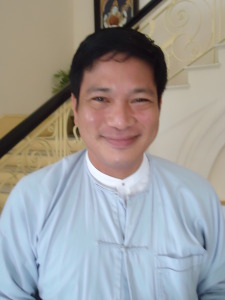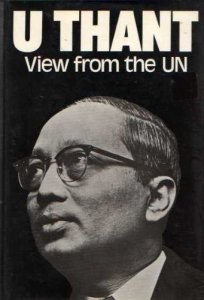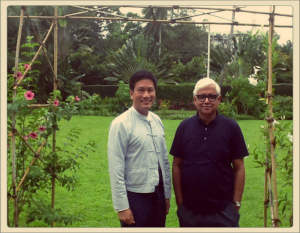Dr Thant Myint-U is one of Burma’s leading contemporary historians.
 His book River of Lost Footsteps is essential reading for anyone interested in Burma. His 2011 book Where China Meets India: Burma and the New Crossroads of Asia has also been widely acclaimed: he was recently named one of the world’s ‘One Hundred Leading Thinkers‘ by Foreign Policy magazine (he has an excellent twitter feed: @thantmyintu ).
His book River of Lost Footsteps is essential reading for anyone interested in Burma. His 2011 book Where China Meets India: Burma and the New Crossroads of Asia has also been widely acclaimed: he was recently named one of the world’s ‘One Hundred Leading Thinkers‘ by Foreign Policy magazine (he has an excellent twitter feed: @thantmyintu ).
Many years ago Thant, as he is known to his friends, gave me a copy of View from the UN,
 a memoir written by his grandfather, U Thant. As Secretary General of the UN from 1961 to 1971, U Thant was once a household name around the world. He played a part in many important events and his memoir is, to my mind, a major historical document: it also makes for compelling reading.
a memoir written by his grandfather, U Thant. As Secretary General of the UN from 1961 to 1971, U Thant was once a household name around the world. He played a part in many important events and his memoir is, to my mind, a major historical document: it also makes for compelling reading.
Much of Thant ‘s childhood was spent in his grandfather’s house in Westchester, New York. He studied at Harvard and the University of Cambridge, where he earned a doctorate in history. He taught history at Cambridge for a few years and has held fellowships at several leading universities around the world. He has also worked at the UN in various capacities. But he is now back in Burma, doing many things: he helps to run a trust commemorating his grandfather; he is the Chairman of the Yangon Heritage Trust; he is a member of the President of Myanmar’s National Economic and Social Advisory Council; and as if that were not enough he is also participating in the ongoing talks between the government and Burma’s ethnic minorities.
I recently met up with Thant in Rangoon,
and we had a long talk about the current situation in Burma: suffice it to say that he is cautiously optimistic.
Shortly after our meeting he wrote me this:
I received the message below just now from U Kyaw Thein Lwin, a former navy officer in his late 80s, and thought you might be interested. He’s an old friend of the family and he knew I had seen you this morning. U Kyaw Thein Lwin is a treasure house of information on 20th century Burmese history. His father was the distinguished educationist U Ba Lwin who founded the Myoma National School in the 1920s and who was a key figure in the country’s fight for independence.


Repelled by Lizards of any size but your narrative was riveting, the photographs vividly recreated the narration.
An ardent fan of your writing and eager for the release of Flood of Fire.